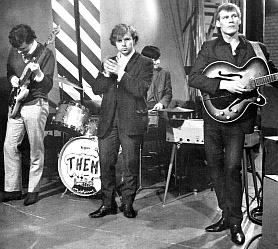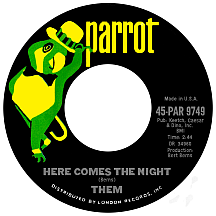THEM
Here Comes the Night
The "Showbands" of the 1950s and '60s are unique to Irish culture. Having evolved from the big bands of earlier decades, these more economically-staffed groups (six to eight members, usually) focused on staging events with wide appeal. No musical style was off-limits: pop, country, trad jazz, Irish folk music, even rock and roll found its way into showband setlists, which placed an emphasis on covers of the latest hit songs. Musicians sometimes developed choreographed routines, not unlike many R&B revues, while occasionally doing humorous routines between songs. In other words, an enjoyable evening was on tap for all who attended, at least in theory. Performing in these groups also provided opportunities for talented but struggling musicians to gain steady employment. One future star who began this way was a teenager from Belfast by the name of George Ivan Morrison. Some know him as Van from Them.
In 1960, when Van was 15, he joined local group Deanie Sands and the Javelins on the showband circuit. Within a year they'd become Georgie and the Monarchs, a more rocking outfit led by singer-guitarist George Jones (to set himself apart from the popular American country singer, not that anyone was paying attention, he'd taken on the "Georgie" nickname). Van did some singing and played harmonica, but was primarily the group's saxophonist. Performances in England and several German cities became a regular affair; the group incorporated more rhythm and blues numbers into the repertoire while leading a budget version of the rock lifestyle, living on a steady diet of junk food, booze, drugs and women. Near the end of '63 they made a record for the German CBS label, "Boo-Zooh" (a manic dance track) backed with "O Twingy Baby" (its lyrics essentially those three words), with vocals by Georgie and strong (but brief) sax breaks by Van. Weeks later the group split up; for all Morrison knew, the Monarchs disc would be his first and last recording.
In 1964, Van played with The Manhattan Showband and The Golden Eagles Showband; the latter morphed into The Gamblers (he was joined by bassist Alan Henderson, who'd gigged with Georgie's Monarchs). In the spring they changed their name to Them, Van and Alan sticking around while earlier members were replaced by lead guitarist Billy Harrison, keyboard player Eric Wrixon and drummer Ronnie Millings. Then the latter two gave in to family pressures and quit, their spots taken by keyboardist Jackie McAuley and his stick-wielding brother Pat McAuley. Word about the group's Belfast gigs trickled down to Decca Records' Dick Rowe, who signed the band; Philip Solomon became their manager and studio sessions were produced by Tommy Scott. In June they laid down several tracks including debut single "Don't Start Crying Now" (a Slim Harpo original from the B side of his 1961 hit "Rainin' in My Heart") and Morrison original "Gloria," which was shelved temporarily, giving The Wheels (made up of former Golden Eagles Showband members and also controlled by Solomon and Scott) an opportunity to record the song, making their cover on EMI's Columbia label the first released version.
An unrelated group called Them appeared in America at the same time. The Torquays (led by singer Paul Simons with an "s," not the N.Y. guy from Tico and the Triumphs) were formed in Cincinnati in 1961, changed their name three years later (after Them!, the 1954 sci-fi film about an invasion of giant ants, the moniker merely a coincidence in the case of Van's band) and had a single ("Don't Look Now") on Cincy's King label in September, concurrent with the debut releases by Ireland's Wheels...and Them. Stateside producer-songwriter Bert Berns had made a trip to the U.K. and sat in on the recording sessions by this so-called band of roughnecks with an anti-Beatles image along the lines of The Rolling Stones. The second Them single, "Baby Please Don't Go," was his suggestion, for which he took songwriter credit despite its being a decades-old blues song of uncertain origin (Joe Williams had recorded it for the Bluebird label in 1935 and The Orioles scored a chart hit with their version in '52). Them brought the song into the rock world, a scorching version that reached the U.K. top ten in February '65 (frequent use on ITV's Ready Steady Go! helped fuel its rise) while establishing Van's vocal prowess; "Gloria" appeared on the B side, making it one of the greatest of rock's two-sided singles.
Them's sophomore coupling took some time finding an audience in North America. "Baby, Please Don't Go" (a comma added to the title) broke first in Los Angeles, reaching number one on the city's leading top 40 outlets, KRLA and KFWB. By the time it peaked in early April, "Gloria" had been added as the hit B side and continued to gain momentum after the single's first wave of popularity. Other stations around the country eventually caught up, though probably not in the way the band would have preferred. Back in the U.K., the next single was an actual Berns song, "Here Comes the Night," giving tempo to a softly-sung version by Lulu that had blipped the U.K. charts in November '64. Making a run for the summit, Them's third single stopped at number two the final week of April (behind the toughest of competition: the Beatles, with "Ticket to Ride"); in the U.S. it far outpaced the previous disc, reaching the top 30 in July. The Angry Young Them (the title of their debut U.K. album, taking a cue from the Stones' first longplay, which had a photo of the band and no titles) had arrived.

The next two 45s, Morrison's "One More Time" and Berns' "(It Won't Hurt) Half as Much" (both sad ballads) flew by rather quickly, as did the sixth U.K. single: "Mystic Eyes," a return to a rocking blues approach (with Van's killer minute-plus harmonica intro) fared poorly at home but connected in the U.S., returning them to the top 40 in December. Meanwhile, "Gloria" continued working its way around the 50 states, gaining airplay, in many cases, without any prompting from U.S. label Parrot. The initial reluctance by some stations in spring '65 involved a couple of lines deemed a bit racy ('...she knock upon my door...and then she comes to my room...n'yeah, she make me feel alright!'). While there were many radio programmers and fans who had no objection, some copies of the single were released with the lines edited out. Then in May 1966, a cover by Chicago band Shadows of Knight (its arrangement bearing more of a similarity to the Wheels' production) made the top ten. Them's original, which hadn't completely run its course, reappeared on the Billboard charts for several weeks during TSOK's run. One of the most-performed songs of its time by artists amateur and professional, "Gloria" ranks among the most infamous of '60s rock tracks.
Billy Harrison and the McAuley brothers quit the group...and suddenly they were booking gigs as Them (and The Other Them)! A legal dispute ensued and Morrison's guys retained the name. The real Them finally embarked on a tour of North America from May to July, which included a three-week stand at Hollywood's Whisky a Go Go with up-and-comers The Doors (two bands with lead singers named Morrison!); during this time and unbeknownst to the band, Decca issued their recording of "Richard Cory" (written by the famous Paul Simon without an "s," not to be confused with Ohio Them singer Paul Simons). Van was not happy about the label and the group's managers doing things without his, and Them's, approval. Once back in the U.K. he quit, leaving Alan Henderson to get yet another group going with the original name.
Meanwhile the McAuley outfit, calling themselves The Belfast Gipsies (sometimes known as Them Belfast Gypsies?!?), entered the studio with globetrotting U.S. producer Kim Fowley and out came "Gloria's Dream (Round and Around)," on the U.K.'s W&G label, with new lyrics set to the "Gloria" melody (the single, on Loma in the U.S., slipped into the "Bubblers" chart in September). A final Belfast Gipsies single, "People! Let's Freak Out," appeared late in the year under the name The Freaks of Nature, a Fowley production with a very rough V.M. vocal facsimile (but impressive harmonica work).
Ken McDowell (of Belfast band The Mad Lads) replaced Van as lead singer and Henderson's Them continued recording though 1970 on several labels (most notably Tower, a Capitol Records subsidiary). "Dirty Old Man (At the Age of Sixteen)" and "Walking in the Queen's Garden" from '67 are solid psych-era gems, though the sound bears no resemblance whatsoever to Them's more significant mid-'60s output. Later efforts include rocked-up remakes of J.J. Jackson's "But It's Alright" and the Charlie Rich hit "Lonely Weekends."
Van Morrison moved to the States and reunited with Bert Berns, who'd started the Bang label two years earlier and already made major inroads with The Strangeloves, The McCoys and Neil Diamond. Van's solo debut, "Brown Eyed Girl," went top ten during '67's "Summer of Love." Follow-up "Ro Ro Rosey" made less of an impact, yet both gave hints of what would come, as he built upon the blues foundation while developing as one of the era's most gifted songwriters. A string of hits on Warner Bros. starting in 1970 ("Come Running," "Domino," "Blue Money," "Wild Night," "Tupelo Honey") gained him a large following. Fans never have to wait long for fresh musical content. Albums have appeared at nearly one-year intervals ever since.


